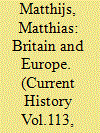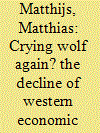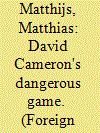|
|
|
Sort Order |
|
|
|
Items / Page
|
|
|
|
|
|
|
| Srl | Item |
| 1 |
ID:
129205


|
|
|
|
|
| Publication |
2014.
|
| Summary/Abstract |
After a tumultuous professional marriage of just over 40 years, Britain and Europe are facing the possibility of divorce. In January 2013, Prime Minister David Cameron decided to celebrate Britain's 40th anniversary as a member of the European Union by pledging a fundamental renegotiation of his country's terms of membership. Cameron further promised to submit any renegotiated deal to a clear "in-or-out" referendum in 2017 on whether or not to leave the EU, assuming his own Conservative Party wins a majority in the next general election in May 2015. Egged on by his party's growing ranks of restive Euroskeptics and trying to fight off a challenge on his right flank from populist Nigel Farage's UK Independence Party (UKIP), Cameron rolled the dice. He hoped to settle once and for all the Europe question, which has so often cast a dark shadow over the political debate in Westminster and Whitehall. Renegotiating
|
|
|
|
|
|
|
|
|
|
|
|
|
|
|
|
| 2 |
ID:
114939


|
|
|
|
|
| Publication |
2012.
|
| Summary/Abstract |
Since the turn of the millennium, scholars and pundits have been musing over the decline of the West. The disappointing US military invasions in Afghanistan and Iraq, together with the subprime mortgage crisis, seem to be evidence of an abrupt end to America's 'unipolar' moment. In Europe, the sovereign debt crisis has amplified Europe's long-term structural economic problems and laid bare the fragile institutional foundation on which the Economic and Monetary Union was built. At the same time, the BRICs and other emerging economies have been growing at unprecedented rates. Those same analysts see a 'decoupling' in the world economy: the developing economies pulling the world out of recession, while the advanced industrial economies are unable to solve their domestic difficulties. So to them, the events of the past five years signify the beginning of the end of Western influence, eventually leading to a more complete rebalancing of the world economy's current 'Western' system of governance. This article argues instead that the West still has a significant edge when it comes to most critical factors that determine long-term economic growth potential, including technology, innovative capacity, research and development, investment climate and education. Furthermore, the transatlantic economy is less vulnerable than the rest of the world to outside economic shocks and might eventually prove more capable of reform than many expect. The current malaise in the transatlantic community might therefore prove once again to be more cyclical than structural. Relying on linear projections, many are 'crying wolf' again, too loud and too soon.
|
|
|
|
|
|
|
|
|
|
|
|
|
|
|
|
| 3 |
ID:
123041


|
|
|
|
|
| Publication |
2013.
|
| Summary/Abstract |
Despite his innate caution and usually sound political instincts, British Prime Minister David Cameron is gambling with his country's future. In January, in a long-anticipated speech, he called for a wide-ranging renegotiation of the terms of the United Kingdom's membership in the European Union and promised to put the result up for a straight in-or-out popular referendum by the end of 2017 (assuming his party wins the next election, due in 2015). A British exit from the EU is now more likely than ever -- and it would be disastrous not only for the United Kingdom but also for the rest of Europe and the United States.
|
|
|
|
|
|
|
|
|
|
|
|
|
|
|
|
| 4 |
ID:
149635


|
|
|
|
|
| Summary/Abstract |
The United Kingdom’s vote to leave the European Union has triggered the worst political crisis the EU has ever faced. Since the early 1950s, the EU has steadily expanded, but on June 23, 52 percent of British voters ignored the experts’ warnings of economic misery and opted to leave the bloc. At the annual British Conservative Party conference in October, Prime Minister Theresa May promised [2] to invoke Article 50, which formally begins negotiations and sets a two-year deadline for leaving the EU, by March 2017.
|
|
|
|
|
|
|
|
|
|
|
|
|
|
|
|
| 5 |
ID:
136505


|
|
|
|
|
| Summary/Abstract |
In 1982, The Economist marked the 25th anniversary of the European Economic Community, the precursor to the European Union, by featuring a tombstone dedicated to the organization on its cover. “Born March 25, 1957. Moribund March 25, 1982,” it read. Then came an epitaph courtesy of the ancient Roman historian Tacitus: Capax imperii nisi imperasset, “It seemed capable of being a power, until it tried to be one.” Inside, the magazine pilloried the community for its institutional weakness, bemoaned its citizens’ growing disenchantment with European integration, and warned of a possible British exit.
|
|
|
|
|
|
|
|
|
|
|
|
|
|
|
|
| 6 |
ID:
186903


|
|
|
| 7 |
ID:
144109


|
|
|
|
|
| Summary/Abstract |
For Angela Merkel, 2015 was a year full of anniversaries. Europe’s longest-serving incumbent head of government celebrated a decade in power as Germany’s chancellor, and 15 years at the helm of her party, the Christian Democratic Union (CDU). Together with her fellow Germans, she also celebrated the quarter-century commemoration of her country’s peaceful reunification of East and West. And as Europe’s most influential leader, she observed how the Old Continent marked the 70th anniversary of Germany’s defeat on Victory in Europe (VE) Day, 8 May 1945, and remembered the end of the Second World War.
|
|
|
|
|
|
|
|
|
|
|
|
|
|
|
|
| 8 |
ID:
159483


|
|
|
|
|
| Summary/Abstract |
Why do bad policy ideas persist over time? We trace the development of the euro’s governing ideas over fiscal and monetary policy in the face of mounting evidence that continued adherence to those ideas was economically deleterious. We argue that a specific form of social learning, framed by a retrospective recoding in 2010–2012 of Europe’s experience with fiscal rules in 2003–2005, drove European elites to pursue policies that were economically irrational but politically rational. As a result, the Eurozone’s medium-term resilience has been made possible by the European Central Bank’s unconventional and loose monetary policies, which operate in direct opposition to the tight fiscal policies of its member states’ governments. We maintain that this self-defeating macroeconomic policy mix will continue as long as the lessons learned by policymakers are driven by the need to win what we term an authority contest, rather than provide better macroeconomic outcomes.
|
|
|
|
|
|
|
|
|
|
|
|
|
|
|
|
|
|
|
|
|